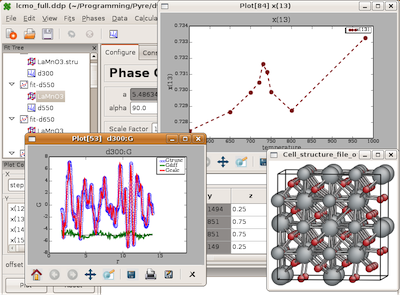diffpy.pdfgui¶
For users who do not have the expertise or necessity for command line analysis, diffpy.pdfgui is a convenient and easy to use graphical front end for the PDFfit2 refinement program. It is capable of full-profile fitting of the atomic pair distribution function (PDF) derived from x-ray or neutron diffraction data and comes with built in graphical and structure visualization capabilities.

Screen-shot of diffpy.pdfgui during a refinement of multiple data-sets¶
Reference¶
If you use this program for a scientific research that leads to publication, we ask that you acknowledge use of the program by citing the following paper in your publication:
C L Farrow, P Juhas, J W Liu, D Bryndin, E S Božin, J Bloch, Th Proffen and S J L Billinge, PDFfit2 and PDFgui: computer programs for studying nanostructure in crystals, J. Phys.: Condens. Matter 19 (2007) 335219.
Installation¶
For the most up-to-date installation instructions, please refer to the installation section of the diffpy.pdfgui README page on GitHub.
Running pdfgui¶
To run diffpy.pdfgui after installation, type the command:
pdfgui
Tutorials¶
Search “PDFgui” on YouTube for some video tutorials on how to use diffpy.pdfgui.
For in-depth help in using diffpy.pdfgui to solve scientific problems please see the book “Atomic Pair Distribution Function Analysis: A primer” by Simon Billinge, Kirsten Jensen, and past and present Billinge group members, published by Oxford University Press. Data for the worked examples can be found here: https://github.com/Billingegroup/pdfttp_data.
Please, join the community forum for tips, tricks, and feedback.
Documentation¶
Documentation for diffpy.pdfgui is available at https://www.diffpy.org/diffpy.pdfgui.
Legacy versions¶
v1.1.2 is the last python 2 version of PDFgui. It is no longer supported, but may be needed to open python 2 generated .ddp project files. It can be installed in a python2 anaconda environment using the commands:
conda config --set restore_free_channel true
conda config --add channels diffpy
conda create --name=py27 python=2.7
conda activate py27
conda install -c diffpy "diffpy.pdfgui==1.1.2"
When Anaconda Python is not available, PDFgui can be installed from sources. The latest source package is at the Python Package Index and the prior versions are at https://github.com/diffpy/diffpy.pdfgui/releases. See the README document for further details on installation from sources,
Finally, here are the previous single-file installers. Although quite outdated, they might be handy if there is some problem with Anaconda or if one needs to install without Internet connection.
Name |
Date |
Size |
Description |
|---|---|---|---|
2009-04-10 |
21.5 M |
Windows self extracting installer |
|
2009-04-10 |
6.4 M |
Linux and Mac tarball |
MD5 check sums for these installer files are available here.